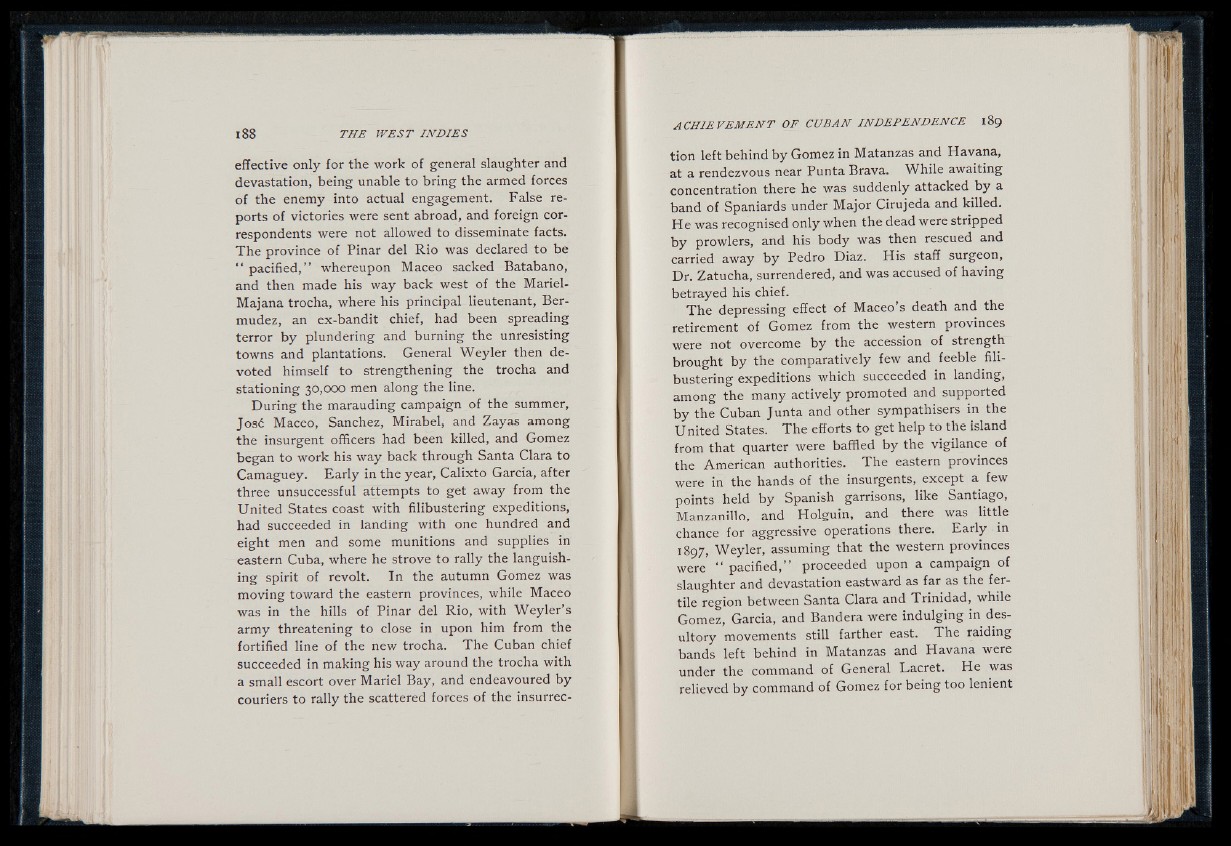
effective only for the work of general slaughter and
devastation, being unable to bring the armed forces
of the enemy into actual engagement. False reports
of victories were sent abroad, and foreign correspondents
were not allowed to disseminate facts.
The province of Pinar del Rio was declared to be
“ pacified,” whereupon Maceo sacked Batabano,
and then made his way back west of the Mariel-
Majana trocha, where his principal lieutenant, Bermudez,
an ex-bandit chief, had been spreading
terror by plundering and burning the unresisting
towns and plantations. General Weyler then devoted
himself to strengthening the trocha and
stationing 30,000 men along the line.
During the marauding campaign of the summer,
José Maceo, Sanchez, Mirabel, and Zayas among
the insurgent officers had been killed, and Gomez
began to work his way back through Santa Clara to
Camaguey. Early in the year, Calixto Garcia, after
three unsuccessful attempts to get away from the
United States coast with filibustering expeditions,
had succeeded in landing with one hundred and
eight men and some munitions and supplies in
eastern Cuba, where he strove to rally the languishing
spirit of revolt. In the autumn Gomez was
moving toward the eastern provinces, while Maceo
was in the hills of Pinar del Rio, with W e y le r ’s
army threatening to close in upon him from the
fortified line of the new trocha. T he Cuban chief
succeeded in making his way around the trocha with
a small escort over Mariel Bay, and endeavoured by
couriers to rally the scattered forces of the insurrection
left behind by Gomez in Matanzas and Havana,
at a rendezvous near Punta Brava. While awaiting
concentration there he was suddenly attacked by a
band of Spaniards under Major Cirujeda and killed.
He was recognised only when the dead were stripped
by prowlers, and his body was then rescued and
carried away by Pedro Diaz. His staff surgeon,
Dr. Zatucha, surrendered, and was accused of having
betrayed his chief.
T h e depressing effect of Maceo’s death and the
retirement of Gomez from the western provinces
were not overcome by the accession of strength
brought by the comparatively few and feeble filibustering
expeditions which succeeded in landing,
among the many actively promoted and supported
by the Cuban Junta and other sympathisers in the
United States. T he efforts to get help to the island
from that quarter were baffled by the vigilance of
the American authorities. T h e eastern provinces
were in the hands of the insurgents, except a few
points held by Spanish garrisons, like Santiago,
Manzanillo, and Holguin, and there was little
chance for aggressive operations there. Early in
1897» Weyler, assuming that the western provinces
were “ pacified,” proceeded upon a campaign of
slaughter and devastation eastward as far as the fertile
region between Santa Clara and Trinidad, while
Gomez, Garcia, and Bandera were indulging in desultory
movements still farther east. The raiding
bands left behind in Matanzas and Havana were
under the command of General Lacret. He was
relieved by command of Gomez for being too lenient